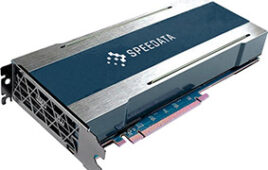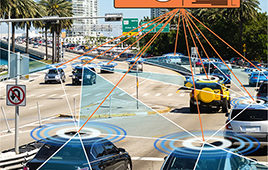A ‘spin ratchet’: A new electronic structure for generating spin current
A research team from the Institut Català de Nanotecnologia (ICN), in Barcelona, has demonstrated a device that induces electron spin motion without net electric currents, a key step in developing the spin computers of the future. The results are published in the Dec 17 issue of the journal Science. The authors are Marius V. Costache and Sergio O. Valenzuela, an ICREA Professor who is leader of the Physics and Engineering of Nanodevices Group at ICN.
Spintronics is a branch of electronics that aims to use the electron spin rather than its charge to transport and store information. The electron spin comes in two forms, “spin up” or “spin down”, and would allow significantly more data to be stored and analyzed than is possible with current electronics. Moreover, spin computers would be able to process vast amounts of information while using less energy and generating much less heat than conventional computers.
Advances in spintronics have already impacted commercial products, enabling a huge increase in storage capacity of magnetic hard disks. However, the devices comprise ferromagnetic multilayers that act as spin filters and require conventional electrical charge currents in order to work. To garner the full potential of spintronics, further fundamental advances are urgently needed.
Researchers working in this field face a key challenge: how to generate and control spins without the simultaneous generation of electric current, and the resultant energy losses? This would enable not just data storage, but calculations to be realized directly using spin states.
As reported in the journal Science, Prof. Valenzuela and Dr. Costache have proposed and experimentally demonstrated a ratchet concept to control the spin motion. In analogy to a ratchet wrench, which provides uniform rotation from oscillatory motion, such ratchets achieve directed spin transport in one direction, in the presence of an oscillating signal. Most important, this signal could be an oscillatory current that results from environmental charge noise; thus future devices based on this concept could function by gathering energy from the environment.
The efficiency of the ratchet can be very high. Reported results show electron polarizations of the order of 50%, but they could easily exceed 90% with device design improvements. The spin ratchet, which relies on a single electron transistor with a superconducting island and normal metal leads, is able to discriminate the electron spin, one electron at a time. The devices can also function in a “diode” regime that resolves spin with nearly 100% efficacy and, given that they work at the single-electron level, they could be utilized to address fundamental questions of quantum mechanics in the solid state or to help prepare the path for ultrapowerful quantum or spin computers.
The main drawback of the devices is that they work at low temperature. However, this does not represent a problem for quantum computing applications as solid state implementations of quantum computers will most likely require similar working conditions. Future research at the ICN will focus on increasing the spin ratchet efficiency and testing different ratchet protocols to implement a working device at room temperature.




